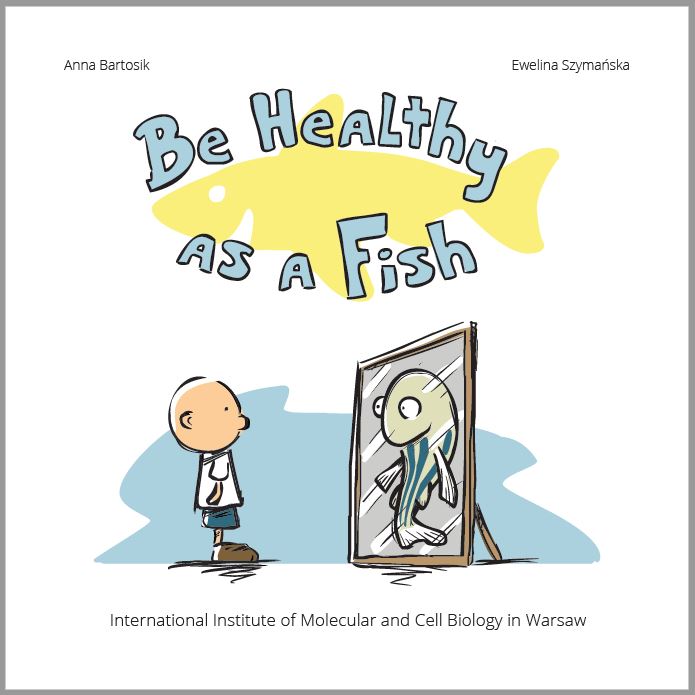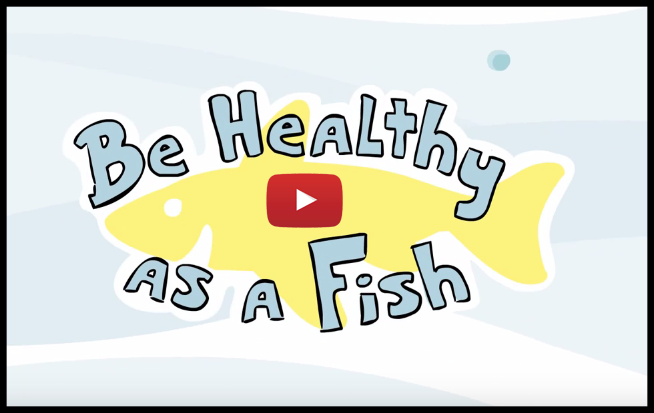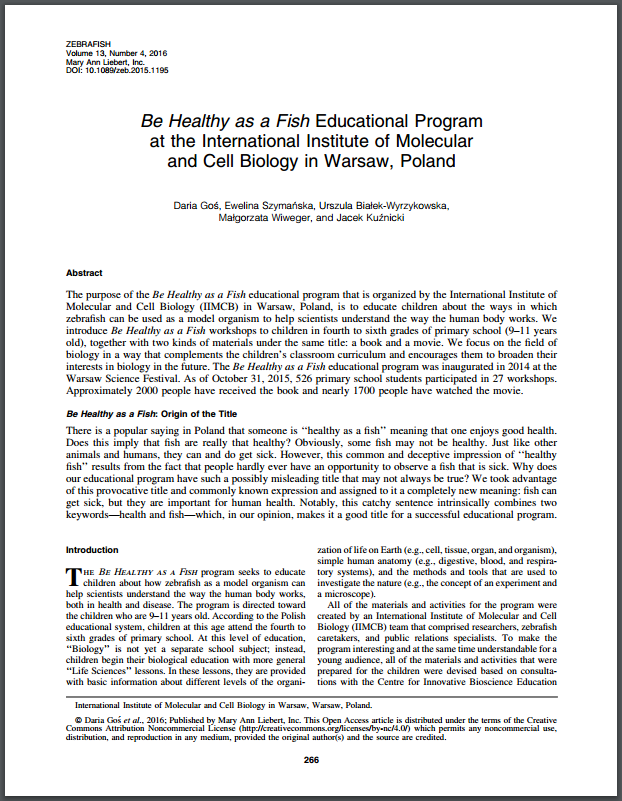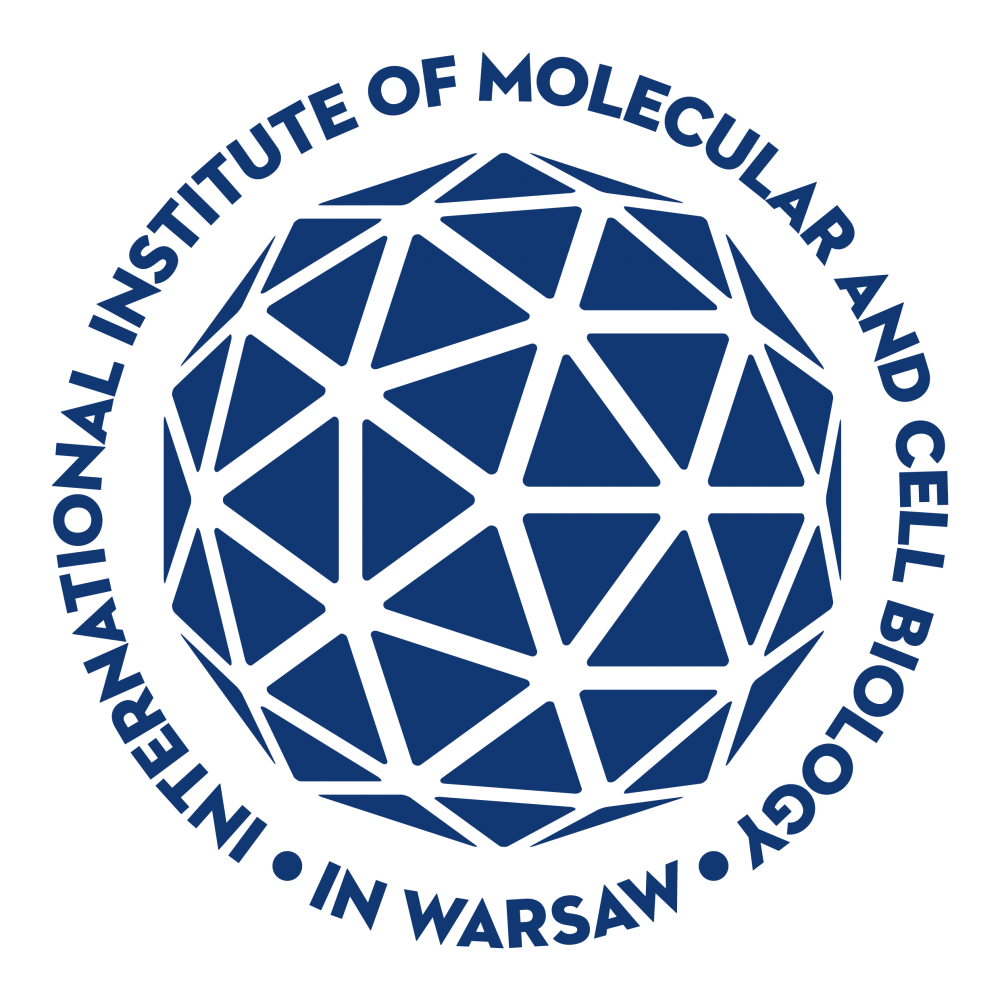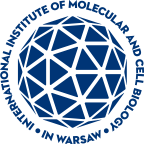
Address
4 Ks. Trojdena Street
02 - 109 Warsaw, Poland
Tax No. PL 526-22-78-704
REGON 013082798
Phone & E-mail
tel. (+48 22) 597 07 00
This email address is being protected from spambots. You need JavaScript enabled to view it.
The main character of the Be Healthy as a Fish educational campaign is the zebrafish, which helps scientists find the cause of certain human diseases and discover new-generation therapies and medicines. The program is directed towards children aged 9-12 years old.

Workshops
For the young target audience, the workshop is an opportunity to visit a real scientific institute. During the classes, the participants are introduced to the zebrafish as a model organism that is used in basic and applied research because of its high genetic similarity to humans, transparent embryos, very short reproduction cycle, access to experimental manipulations, a large collection of mutant/transgenic lines, and low maintenance cost. Therefore, the zebrafish is an attractive alternative to mammalian in vivo models and can be used to implement the “3R” principles (reduction, replacement, and refinement). To empathize with the role of scientists, the students observe 1- to 2-day-old zebrafish embryos under a stereoscopic microscope. They have the opportunity to see the beating heart of a small fish and living brine shrimp (Artemia) larvae and rotifers. They learn that zebrafish development is very similar to the embryogenesis of higher vertebrates. In contrast to mammals, zebrafish develop from fertilized, transparent eggs outside the mother’s body, which allows scientists to observe the embryogenesis process.
Participants of the workshop learn how much the human body is similar in its genesis and development to the body of a small fish. They learn that when scientists observe the zebrafish, human embryogenesis, and the mechanisms of the human body, various functions can be better understood. By explaining the concept of the homology of genomes, they are shown the importance of animals in the multi-stage process of discovering new drugs and therapies. We also show participants how we breed zebrafish and how we tend to their welfare. We familiarize children with the issues of ethics in research that is performed with animals. The participants independently investigate water properties by performing calorimetric tests and measuring the pH and hardness of tap water and aquarium water that is used in the facility. Water analyses are supervised by animal caretakers who work at IIMCB. The children are permitted to perform water tests themselves and have the opportunity to ask questions about zebrafish husbandry, fish biology, operation of the fish facility, and other tasks. At the end of the workshop, the students are given the Be Healthy as a Fish book and a three-dimensional bookmark with images of zebrafish.
Movie
The aim of the movie is to familiarize viewers with IIMCB’s facilities and scientific interests and show the everyday work lives of scientists. This 6-min movie is mostly animated. However, part of it shows real images of various locations within the institute (e.g., laboratories, fish facility, the office of the Director of IIMCB, and a lecture hall where the workshops are held). The storyline of the animation consists of a humorous tour around the institute that is guided by two cartoon characters: the Professor and a zebrafish. During the tour, the children are told the reason why the zebrafish facility was established, and they can witness the formation of a new international team of scientists. The viewers are informed that science has no borders, and new discoveries result from joint efforts of scientists around the world who exchange information during seminars and conferences. Both Polish and English versions of the movie are available on the IIMCB YouTube channel.
Book
The book brings the complex world of science closer to young readers. Because the book is geared toward primary school children with an elementary knowledge of life sciences, it is illustrated with cartoons to make the content more interesting for a young audience. Moreover, to help readers absorb the story’s message, the book provides engaging assignments. A short glossary defines terms that are used in the book that may be difficult for some readers to understand. Importantly, the factual content was created in consultation with an educational biology expert to ensure that the message of the story is both understandable and inspiring for a young audience.
The book is distributed to all of the participants of the workshop as an invitation to broaden their knowledge beyond the topics that are discussed in their classes. The content of the book was written such that it can be regarded as an independent story from which those who do not participate in the workshops can benefit. The Be Healthy as a Fish book can be interesting additional material for teachers to support discussions about the evolution of life, cell biology, heredity, and anatomical similarities between humans and animals.
Achievements
• Presentation about the campaign at 9th European Zebrafish Meeting in Oslo, Norway
• Poster prize at 6th European Forum for Marketing of Scientific and Research Organizations in Warsaw, Poland
• Publication in the Zebrafish Journal (Goś et al., 2016, doi: 10.1089/zeb.2015.1195)
• Presentation about the campaign at 7th European Forum for Marketing of Scientific and Research Organizations in Warsaw, Poland
• Publication in the Polish Journal of Environmental Sciences “Wszechświat” (no 10-12 2016)
"Be Healthy as a Fish" book
"Be Healthy as a Fish" movie
Publication in Zebrafish
Be Healthy as a Fish Educational Program at the International Institute of Molecular and Cell Biology in Warsaw, Poland
Goś Daria, Szymańska Ewelina, Białek-Wyrzykowska Urszula, Wiweger Małgorzata, and Kuźnicki Jacek. Zebrafish. June 2016, 13(4): 266-271. doi:10.1089/zeb.2015.1195.
Group members
| Head Mikołaj Cup |
Laboratory Manager Paweł Morga |
| Project Manager Agnieszka Muśnicka |
Lead Educators Jakub Tomaszewski Małgorzata Malczewska |
BioCEN - Touch Science!
The Centre for Innovative Bioscience Education (BioCEN) was established in 2002 by the International Institute of Molecular and Cell Biology in Warsaw, the Nencki Institute of Experimental Biology, and the Institute of Biochemistry and Biophysics.
BioCEN exists to bridge the gap between the scientific community and society by providing educational activities that popularize modern experimental natural sciences among the broader community. We use innovative educational methods to provide hands-on experience in topics of interest. Our workshops, presentations, and educational materials are based on scientific findings and the expertise of our collaborators. BioCEN receives financial support from IIMCB, which has been BioCEN’s Strategic Sponsor since 2015. In addition to IIMCB’s support, BioCEN is subsidized by Nencki Institute, Institute of Biochemistry and Biophysics, University of Warsaw Faculty of Biology, and BioEducation Foundation.
BioCEN Laboratory
BioCEN workshops cover various areas of life sciences and medicine, with a focus on practical and experimental approaches. Our goal is to cover several scientifically and educationally important topics, such as molecular and cell biology, histology, immunology, biochemistry, biotechnology, microbiology, biophysics, plant physiology, bionics/bioengineering, environmental sciences, medical sciences, astrobiology, and astrophysics. We encourage participating students to express their creativity while working individually on real-life experiments.
A total of 7,568 students participated in laboratory and outdoor workshops in 2023, and our materials reached ~6500 recipients. Moreover, various BioCEN online activities were viewed over 60.000 times.
Target audience
BioCEN's regular workshop offer is available to all primary school students (from the second grade onwards) and high school students from all over Poland. The classes are tailored to the needs and capabilities of students at their respective educational levels. The presented experiments make students aware that the theoretical knowledge found in textbooks directly translates into reality. Thus, BioCEN's slogan "Touch Science!" perfectly reflects our mission.
You can register for our workshops via the BioCEN website: https://biocen.edu.pl/kalendarz/
Customized BioCEN Workshops
Since our team consists of many specialists from various fields, we can design customized workshops for audiences other than schools. As BioCEN, we have repeatedly offered special classes for kindergartens, educational foundations, groups of adult enthusiasts, and university students.
As an educational and science popularization institution, BioCEN also designs workshops for the healthcare and cosmetics industries. We conduct classes that can enhance events such as conferences, training sessions, or scientific symposia. Our regular collaborators include renowned cosmetics companies.
If you are interested in organizing personalized workshops, please contact us by sending email to the Scientific Project Coordinator (This email address is being protected from spambots. You need JavaScript enabled to view it.).
WORKSHOP OFFER
Classes for primary schools (2h):
- Microbe Hunters (Primary school)
- CSI: BioCEN
- Green Factories of Sweetness
- Look Inside the Cell (Primary school)
- See Your DNA (Primary school)
Classes for secondary schools:
Two-hour workshops:
- Microbe Hunters (High school)
- Look Inside the Cell (High school)
- See Your DNA (High school)
Four-hour workshops:
- Synergy – The Inner Life of the Cell
- Histology
- Sokaris – Introduction to Astrobiology
General Structure of Workshops at BioCEN
We host our workshops in the BioCEN Laboratory, located at Skierniewicka Street 21 (100 meters from the Płocka metro station).
The classes are usually divided into a short theoretical introduction, during which we familiarize students with safety rules, workflow in the BioCEN Laboratory and introduce the necessary concepts for conducting experiments. Then our educators instruct students on how to perform the experiments and discuss their individual stages. After completing the experiments, students gather the results of their work and discuss them together, drawing appropriate conclusions.
During the classes, our educators are available to answer students' questions about the experiments being conducted, scientific work, and available pathways of further development.
Collaboration with IIMCB
BioCEN supports the outreach activities organized by IIMCB by:
- Organizing activities for exceptional youth associated by the National Children’s Fund
- Organizing scientific seminars for schools collaborating with the Institute
- Co-designing educational resources for scientific projects such as “Degradator - A Game about Protein Degradation”
Collaboration with other entities
BioCEN co-organizes the annual Symposia for Teachers with the Nencki Institute of Experimental Biology (link: Symposia for Teachers), where we share our experience in popularizing science.
Together with Nencki EduTube (link: //www.youtube.com/@NenckiEduTube">Nencki EduTube), we prepare lectures to introduce students to aspects of the research work of our educators.
BIOCEN EDUCATORS AND COLLABORATORS
Notable members of the BioCEN team include educators and coworkers without whom our educational activities would not be possible. In 2023, the following individuals collaborated with BioCEN:
Educators: Dasza Babiuk, Julia Brzykcy, Julia Gilewska, Rafał Jabłuszewski, Jakub Janiec, Aleksandra Kowalczyk, Katarzyna Krzyżewska, Paweł Morga, Maksymilian Nowak, Małgorzata Orłowska, Magdalena Pełka, Gustaw Zientarski, Jedrzej Kardasz, Alina Kiedryńska, Kalina Węgrzyn, Adela Jezierska-Suwińska, Hubert Kubiszewski, Zuzanna Napora, Stanisław Szleszkowski, Aleksandra Maciejczuk
Lead Educators: Małgorzata Malczewska, Jakub Tomaszewski
Laboratory Support Personnel: Paweł Morga, Małgorzata Malczewska
Management Board Members: Mikołaj Cup (CEO), Patrycja Dołowy, Maciej Kotliński
HR Excellence in Research
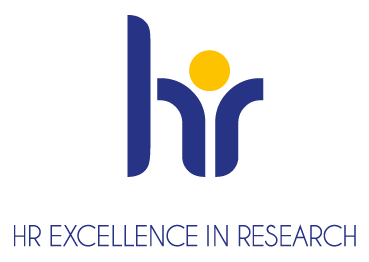
Since 2013, the International Institute of Molecular and Cell Biology in Warsaw has been a holder of the HR Excellence in Research logo. This prestigious recognition acknowledges IIMCB as an attractive place for researchers to work and develop their careers. IIMCB actively and consciously adheres to the principles of the European Charter and Code for Researchers.
HR Logo Working Group
The HR Logo Working Group is involved in implementing the activities at the IIMCB. The working group is supported by the IIMCB Directors (Decision 4.2025 on appointing HR Excellence in Research Working Group).
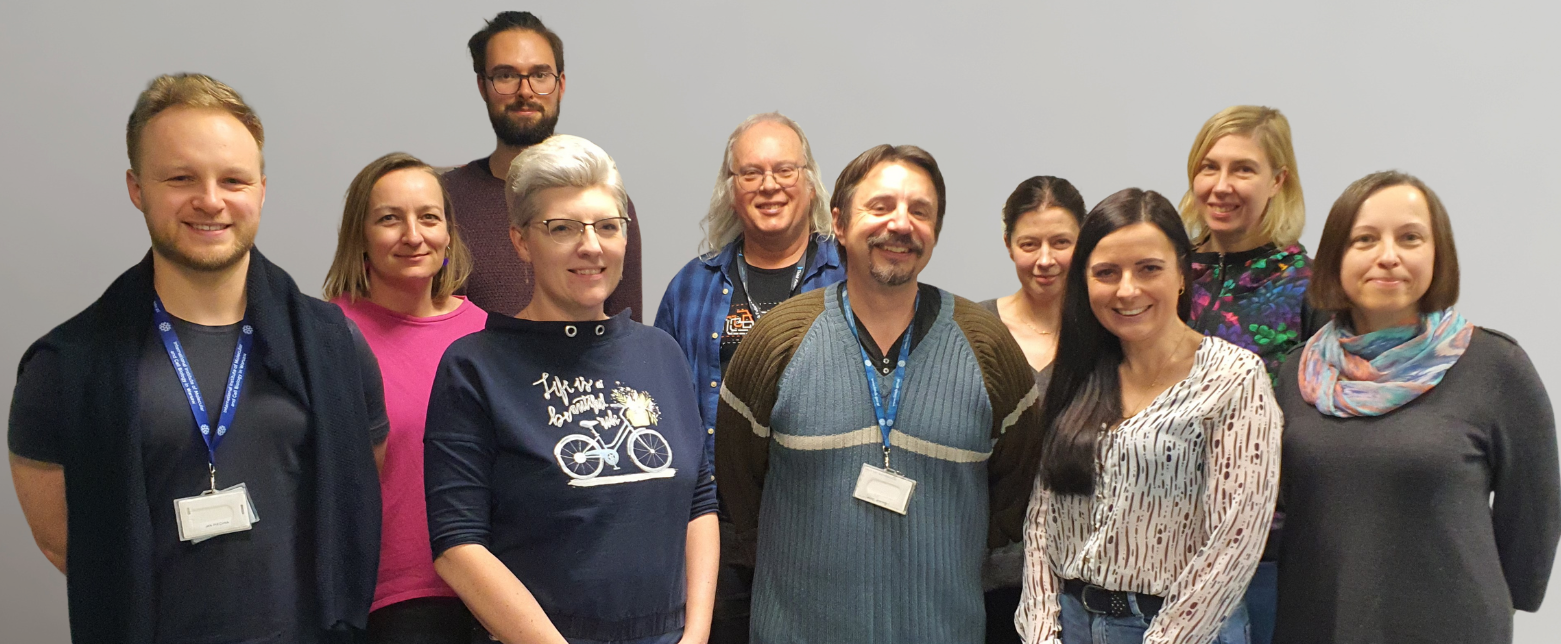 HR Logo Working Group in 2024
HR Logo Working Group in 2024
Why it's worth working in IIMCB?
- The official language of communication at the IIMCB is English
- Internal documents are available in English
- We have a person dedicated to supporting foreigners, who helps with all the formalities related to arrival in Poland and in-residence issues
- We offer a wide range of benefits under the Social Fund (including a sports card)
- We have additional private medical insurance partially funded by IIMCB
- Researchers work on a task-oriented work system
- We offer flexible working hours
- We have a supportive mentoring program and other useful guides available internally
Our recruitment processes are open, transparent and merit-based
Since the start of its activities in 1999 IIMCB has managed open, transparent, and merit-based competitions. Such a recruitment procedure refers to all scientists staff and is one of the fundamental rules governing the functioning of IIMCB.
- We advertise in ENG so anyone from anywhere can join us
- Our offers can be found at IIMCB website, EURAXESS, and international portals
- We inform our candidates about application status
- We involve Recruitment Committee in each step of the recruitment process
- We value people by their merits: creativity, mobility, potential for further development, and level of independence are as much important as scientific excellence
- We recruit regardless of age, gender, culture, race or disability

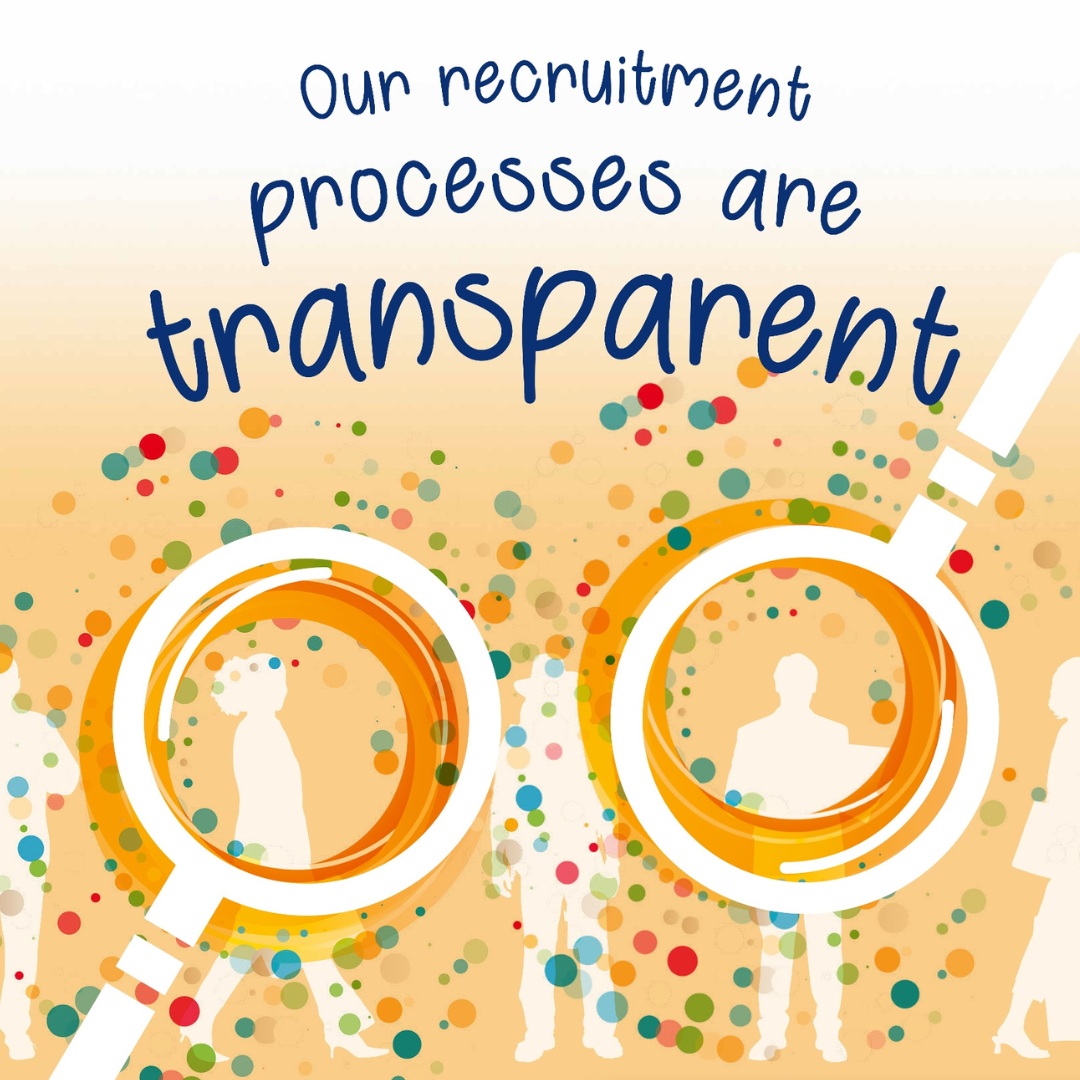

How do we help foreigners who would like to begin working at IIMCB?
A dedicated employee of the HR Unit provides comprehensive support and professional care in the field of legalization of stay and employment of foreigners in IIMCB.
You may find a detailed range of support under the link: support for foreigners
You can contact us at email address: This email address is being protected from spambots. You need JavaScript enabled to view it.
EURAXESS - Researchers in Motion
We strongly encourage you to visit https://euraxess.ec.europa.eu/. EURAXESS - Researchers in Motion is a one-stop shop for researchers and innovators seeking to advance their careers and personal development by moving to other countries. It provides tailored information and support, free of charge, to researchers, entrepreneurs, and research performing organizations. This unique web portal offers job, funding and hosting opportunities, career development guidance, free tools, and much more.
Documents
-
Declaration of commitment to adopt the European Charter for Researchers and the Code of Conduct for the Recruitment of Researchers
-
New recommendations to the European Charter for Researchers and the Code of Conduct for Recruitment
-
IIMCB HR Strategy for Researchers: Action Plan for the period 2013 – 2015
-
IIMCB Report on Action Plan 2013 – 2015 and New Action Plan 2016 – 2018
-
IIMCB Interim self-assessment 2018 and New Action Plan 2019 – 2021
-
IIMCB Report on Action Plan 2019 – 2021 and New Action Plan 2022 – 2024
-
IIMCB Report on Action Plan 2022 – 2024 and New Action Plan 2025 – 2027
-
Order 13.2024 on the procedure for reporting irregularities and protecting whistleblowers
Recruitment rules
Gender Equality Plan
One of the priorities of IIMCB is to foster a working environment in which all individuals are treated equally, with respect, and with fairness therefore, in 2021, the IIMCB implemented the Gender Equality Plan. More information: https://www.iimcb.gov.pl/en/career-education/gender-equality-plan
2020
- Biotechnologia.pl: Jak zapewnić bezpieczeństwo zdrowotne w Europie? Koncepcja instytutów badawczych międzynarodowego konsorcjum EU-LIFE
-
Newseria Innowacje: Superkomputery pomogą w walce z koronawirusem. Gigantyczna moc obliczeniowa przyspieszy prace nad lekami i szczepionką
-
KE, przedstawicielstwo w Polsce: Superkomputery w walce z koronawirusem
-
RPK Politechnika Śląska: Jak zapewnić bezpieczeństwo zdrowotne w Europie? Koncepcja instytutów badawczych międzynarodowego konsorcjum EU-LIFE
-
Forum Akademickie: Jak zapewnić bezpieczeństwo zdrowotne w europie? Koncepcja instytutów badawczych EU-LIFE
-
European Commission: Coronavirus: Using European supercomputing, EU-funded research project announces promising results for potential treatment
-
Forum Akademickie: List otwarty do prezesa PAN profesora Jerzego Duszyńskiego (pisze: prof. J. Kuźnicki)
-
EU-LIFE: EU-LIFE institutes response to Coronavirus outbreak
-
European Connected Health Alliance (ECHAlliance): Fighting coronavirus: European supercomputers join pharmaceutical companies in hunt for new drugs
-
Teraz Polska: Pokażmy społeczeństwu, jak ważna jest nauka w rozwiązywaniu problemów skomplikowanego świata (rozmowa z prof. J.Bujnickim)
-
Forum Akademickie: Badacze PAN doradzą resortowi nauki ws. pandemii COVID-19
-
Fundacja na rzecz Nauki Polskiej: Laureaci FNP w grupie doradców ds. zapobiegania COVID-19
-
Wprost. Zdrowie i Medycyna: Resort nauki powołał zespół doradczy ds. działań związanych z zapobieganiem i zwalczaniem COVID-19
-
Biotechnologia.pl: Badacze PAN doradzą resortowi nauki ws. pandemii COVID-19
-
Nauka w Polsce: Resort nauki powołał zespół doradczy ds. działań związanych z zapobieganiem i zwalczaniem COVID-19
-
European Research Council Magazine (ERC): Frontier research at the service of the coronavirus epidemic response
-
Science Business: Commission announces winners of its first coronavirus research call
-
Urania - Postępy Astronomii: CBK PAN na liście rankingowej konkursu SC1-PHE-CORONAVIRUS-2020
-
Foundation for Polish Science: Winners and Scholarship Holders of FNP Programs Fight Against COVID-19
-
Krajowy Punk Kontaktowy: Wyniki szybkiego konkursu SC1-PHE-CORONAVIRUS-2020 ogłoszone. W badaniach wezmą udział polskie instytucje
-
Fundacja na rzecz Nauki Polskiej: Nowe podejście w terapii stwardnienia guzowatego? Wyniki badań laureatów FNP w PNAS
-
Forum Akademickie: Nowe podejście w terapii stwardnienia guzowatego?
-
Serwis Programu Inteligentny Rozwój: Beneficjenci funduszy UE w walce z COVID-19
-
Forum Akademickie: Poszukiwanie terapii przeciwko koronawirusowi
-
CORDIS EU research results: EXaSCale smArt pLatform Against paThogEns for Corona Virus
-
Biotechnologia.pl: Polacy w walce z COVID-19 – podsumowanie najważniejszych badań laureatów i stypendystów programów FNP
-
European Commission: European Commission announces winners of its first coronavirus research call
-
Forum Akademickie: Praca nad lekiem COVID-19?
-
Polish Science: Polish scientist receives a grant to develop anti-coronavirus therapy
-
Polish Science. Polska Nauka: Polski naukowiec z grantem na opracowanie terapii przeciwko koronawirusowi
-
PRESTIŻ - RELACJE GOSPODARCZE: Polscy naukowcy w walce z COVID-19
-
Fundacja na rzecz Nauki Polskiej: Laureaci i stypendyści programów FNP w walce z COVID-19
-
Forum Akademicie: Prof. Marcin Nowotny na czele KPN
-
Swiss National Science Foundation: EXSCALATE4CoV - EXaSCale smArt pLatform Against paThogEns for Corona Virus
-
AboutPharma online: Supercomputer, il progetto italiano Exscalate si aggiudica 3 milioni dall’Ue contro Covid-19
-
Hardware Upgrade: Coronavirus: anche l'UE accende i supercomputer e l'Italia è protagonista
-
HPC Wire: Exscalate4CoV Awarded €3M EU Call to Combat Coronavirus
-
Ministerstwo Nauki i Szkolnictwa Wyższego: Międzynarodowy Instytut Biologii Molekularnej i Komórkowej w Warszawie (MIBMiK) pierwszym polskim członkiem prestiżowego konsorcjum EU-LIFE
-
Krajowy Punk Kontaktowy (KPK): MIBMiK pierwszym polskim członkiem prestiżowego konsorcjum EU-LIFE
-
Biotechnologia.pl: Otwarcie Laboratorium Biologii RNA w Międzynarodowym Instytucie Biologii Molekularnej i Komórkowej w Warszawie - wywiad z prof. dr. hab. Andrzejem Dziembowskim
-
Forum Akademickie: MIBMIK pierwszym polskim członkiem prestiżowego konsorcjum EU-LIFE
-
PAN: Międzynarodowy Instytut Biologii Molekularnej i Komórkowej dołącza do EU-LIFE
-
Nauka w Polsce: Międzynarodowy Instytut Biologii Molekularnej i Komórkowej w Warszawie członkiem konsorcjum EU-LIFE
-
Rynek Zdrowia: Międzynarodowy Instytut Biologii Molekularnej i Komórkowej w Warszawie członkiem konsorcjum EU-LIFE
-
Nauka w Polsce: Pięta achillesowa" komórek nowotworu jelita grubego zidentyfikowana
-
Zdrowie. Wprost: „Pięta achillesowa” komórek nowotworu jelita grubego zidentyfikowana
-
Razem z Tobą: „Pięta achillesowa” komórek nowotworu jelita grubego zidentyfikowana
-
Medical Guidelines: Pięta achillesowa komórek nowotworu jelita grubego zidentyfikowana
-
Rynek Zdrowia: Zidentyfikowano "piętę achillesową" komórek nowotworu jelita grubego
-
Liderzy Innowacyjności: „Pięta achillesowa” komórek nowotworu jelita grubego zidentyfikowana
-
Puls Medycyny: Otwarcie Laboratorium Biologii RNA w Międzynarodowym Instytucie Biologii Molekularnej i Komórkowej w Warszawie
-
Polska Agencja Prasowa (PAP): Otwarcie Laboratorium Biologii RNA w Międzynarodowym Instytucie Biologii Molekularnej i Komórkowej w Warszawie
-
Centrum Prasowe PAP: Otwarcie Laboratorium Biologii RNA w Międzynarodowym Instytucie Biologii Molekularnej i Komórkowej w Warszawie
-
Biotechnologia.pl: Otwarcie Laboratorium Biologii RNA w Międzynarodowym Instytucie Biologii Molekularnej i Komórkowej w Warszawie
-
Leksykon.pl: W Warszawie otwarto Laboratorium Biologii RNA
-
Laboratorium Medyczne: W Warszawie otwarto Laboratorium Biologii RNA
-
Nauka w Polsce: W Warszawie otwarto Laboratorium Biologii RNA
-
Nauka w Polsce: Gene Research Lab Opens in Warsaw
2019
-
Krajowy Punkt Kontaktowy: Otwarcie nowej grupy badawczej w ramach projektu ERA Chairs w MIBMiK
-
Forum Akademickie: RUSZA LABORATORIUM BIOLOGII RNA
-
Ministry of Science and Higher Education: Three new Dioscuri Centres in Poland
-
KOLEJNYCH DWÓCH BIOLOGÓW MOLEKULARNYCH Z POLSKI W EMBO, Forum Akademickie
-
List naukowców: nie blokujmy reformy nauki, PAP Nauka w Polsce
-
Dyrektorzy instytutów PAN: apelujemy o odrzucenie mowy nienawiści, PAP Nauka w Polsce
2018
-
Prestiżowy grant unijny w ramach Horyzontu2020 dla polskiego instytutu badawczego, Biotechnologia.pl
-
Unijny grant ERA Chairs dla warszawskiego instytutu MIBMiK, PAP Nauka w Polsce
-
Zebrafish: A tiny fish with big research impact, Radio Poland
-
Rybka danio ma depresję i inne ludzkie choroby, dlatego na niej testują leki, Zdrowie Wolters Kluwer
-
Danio pręgowany - rybka, która w 80 proc. przypomina człowieka, Poradnik Zdrowie
-
Rybka akwariowa pozwoli wynaleźć leki na wiele groźnych chorób, Aptekarz.pl
-
Danio pręgowany - mała rybka, która pomaga poznać ludzkie choroby, PAP Nauka w Polsce
-
Powstanie pierwsze w Polsce Centrum Medycyny Translacyjnej i Regeneracyjnej, ISB Zdrowie
-
Jak nasze komórki utrzymują równowagę? Bada to warszawski biolog, PAP Nauka w Polsce
-
ZEBRAFISH, Login: Nauka, TVP3 (the last video material is dedicated to zebrafish)
2017
-
Nowy, eksperymentalny sposób walki z gronkowcem, Polskie Radio
-
Trwa zacięta bitwa o prawa do technologii edycji genów CRISPR, PAP Nauka w Polsce
-
Naukowcy doradzają politykom: Bujnicki o misji wysokich doradców KE, PAP Nauka w Polsce
-
Powstanie 10 Centrów Doskonałości Naukowej Dioscuri, PAP Nauka w Polsce
-
Ponad 72 mln zł na innowacyjne badania od FNP, PAP Nauka w Polsce
-
Bujnicki: nowe techniki edycji genów wciąż nie są ujęte w prawie, PAP Nauka w Polsce
2016
-
Panel dyskusyjny BIO 2016 - kobiety w nauce. Gorzka prawda i alarm do działania, Biotechnologia.pl
-
„Siedmioro wspaniałych” w Komisji Europejskiej. „Dostarczamy dowody naukowe politykom”, Radio RDC
-
Badania mitochondriów pomogą w walce z Parkinsonem, Strona Parkinsona
-
Badania mitochondriów - krok na drodze do terapii, PAP Nauka w Polsce
-
Badania podstawowe - na pohybel starości, PAP Nauka w Polsce
-
Beneficjenci ERC: polski system nie sprzyja zdobywaniu grantów ERC, PAP Nauka w Polsce
-
Rybka doświadczalna pomaga w poznawaniu ludzkich chorób, PAP Nauka w Polsce
-
Pracowania Hodowli Danio Pręgowanego (31.03.2016), PAP Nauka w Polsce
-
Praktyki/staże wakacyjne zaczynają szukać człowieka ambitnego, o CV dbającego, Biotechnologia
2015
-
Wyróżnienia dla polskich innowatorów - za opatrunki, leki i inne odkrycia, Rynek Seniora
-
Eksperci o Noblu: błędy w naprawie DNA sprzyjają powstawaniu nowotworów, Onet.pl
-
Dr Nowotny o Noblu z chemii: to był pewnie dla Komitetu trudny wybór, PAP Nauka w Polsce
-
Handel danymi DNA pacjentów? Łakomy kąsek dla firm farmaceutycznych, Kulisy24
-
Polacy wykryli mechanizm, który może ochronić przed Parkinsonem, Polskie Radio
-
Polscy naukowcy odkryli jeden z mechanizmów chroniących komórki, PAP Nauka w Polsce
-
"Jak zeskoczyć tutaj na spadochronie i nie trafić w bagno". Polscy naukowcy z zagranicy przyjeżdżają do Warszawy, Gazeta Wyborcza
-
Prof. Bujnicki: naukowiec walczący o grant powinien mieć armię pomocników, PAP Nauka w Polsce
-
Naukowcy: praca mitochondriów pozwoli zrozumieć procesy starzenia, Rynek Seniora
-
Jak działają nasze elektrownie komórkowe, czyli mitochondria?, Polskie Radio
-
Podejrzano jak mitochondria robią porządki, PAP Nauka w Polsce
-
Poland making moves to lift barriers to investing in drug discovery, Science|Business
-
Rola nauki w służbie innowacyjnego społeczeństwa, Teraz Polska
-
Resort nauki zachęca do podpisywania Europejskiej Karty Naukowca, PAP Nauka w Polsce
-
Wręczenie Nagród Prezesa Rady Ministrów za wybitne osiągnięcia naukowe i artystyczne, Press Warszawa
-
Premier wręczyła nagrody za działalność naukową i artystyczną, PAP Nauka w Polsce
-
Przełomowe odkrycie w polskim laboratorium. Opracowano "molekularne nożyczki", TVN Meteo
-
Polscy naukowcy odkryli nożyczki do cięcia RNA'', Forum Akademickie
-
Polscy naukowcy odkryli ,,nożyczki do cięcia RNA'', Gazeta Wyborcza
-
Polscy naukowcy odkryli ,,nożyczki do cięcia RNA'', PAP Nauka w Polsce
-
Polscy naukowcy odkryli ,,nożyczki do cięcia RNA'', PANORAMA PAN
2014
-
XIV gala wręczenia stypendiów L'Oreal Polska w Warszawie, PAP Nauka w Polsce
-
Stypendia naukowe L'Oreal dla badaczek związanych z medycyną, Rynek Zdrowia
-
Dr Małgorzata Mossakowska: ''Stulatków będzie przybywać'', Dziennika Łódzki
-
Trzech wybitnych z prestiżowymi nagrodami NCN, Gazeta Wyborcza Kraków
-
7 pytań do dr Małgorzaty Mossakowskiej badającej polskich stulatków, Wiedza i życie
-
Poznawaj ludzi, pytaj, pracuj - trzy rady na nowy rok akademicki, Metro
-
Ludzie nauki: młodzi mistrzowie badają komórki nerwowe i DNA, Polskie Radio
-
Finansowy Impuls dla dziesięciorga naukowców od FNP, PAP Nauka w Polsce
-
Im udało się zrobić karierę. W jaki sposób?, Gazeta Wyborcza
-
Otwarcie Centrum Biotechnologii Molekularnej, Forum Akademickie
-
Minister nauki: potrzebna większa aktywność ws. programu Horyzont 2020, Gazeta Wyborcza
-
Minister nauki: potrzebna większa aktywność ws. programu Horyzont 2020, PAP Nauka w Polsce
-
Co z polską ustawą genetyczną?, POLITYKA Niezbędnik Inteligenta
-
Prezydent wręczył nominacje 35 profesorom, PAP Nauka w Polsce
-
Konferencja ,,Heart of Europe: Zebrafish Meeting'', Biotechnologia
-
Twarze Biotechnologii: prof. Janusz M. Bujnicki, Biotechnologia
-
Nowoczesny mikroskop w badaniach w ramach projektu FishMed, Rynek Zdrowia
-
Wyjątkowy mikroskop zbada danio pręgowanego, PAP Nauka w Polsce
-
Wyścig z obcym - rozmowa z prof. Marią Barcikowską-Kotowicz i prof. Jackiem Kuźnickim, Polityka
-
Zdobywca grantów ERC pomoże badaczom pozyskiwać finansowanie, PAP Nauka w Polsce
-
Kolejne mamy - badaczki nagrodzone w programie Pomost, PAP Nauka w Polsce
-
Metylotransferazy. Ważne odkrycie Polaków trafiło na łamy "Nature", Polskie Radio
-
Polish scientists uncover the secrets of methyltransferase, PAP News of Polish Science
-
Krystalografia królową nauk w 2014 roku, Portal Biotechnologia.pl
-
Polski ośrodek koordynuje badania nad epilepsją, Rynekzdrowia.pl
-
Eksperci: projekt EPISTOP szansą na poznanie tajemnic padaczki, PAP Nauka w Polsce
-
Naukowcy poszukują korzeni padaczki. Główną rolę w projekcie odgrywają badacze z Polski, Wyborcza.pl
2013
-
Uczona z Singapuru tworzy zespół badawczy w Polsce, PAP Nauka w Polsce
-
O finansowaniu nauki w Polsce rozmawiamy z prof. Maciejem Żyliczem, Portal Biotechnologia.pl
-
,,Kryształowa Brukselka dla Dyrektora MIBMiK, Portal Biotechnologia.pl
-
Bakterie, komputery i dadaizm. Wywiad z Januszem Bujnickim, NaTemat.pl
-
Polska instytucja naukowa z prestiżowym znakiem Komisji Europejskiej, Wyborcza.pl
-
Można się dziwić dlaczego dopiero teraz Komitet Noblowski docenił wagę tych odkryć, RMF24.pl
-
Czy projekt ETTBio pomoże zwiększyć wpływ instytutów naukowych na rozwój gospodarczy regionu?, Portal Biotechnologia.pl
-
Biotechnolodzy o skuteczniejszej komercjalizacji badań, PAP Nauka w Polsce
-
Wykonywanie badań genetycznych wymaga uregulowań prawnych, Rynekzdrowia.pl
-
Prof. Bujnicki: polskie wnioski zbyt zachowawcze, by zyskać granty ERC, PulsBiznesu.pl
-
Rybki pomogą polskim badaczom w odkryciu tajników ludzkich chorób, PAP Nauka w Polsce
-
Ryby doświadczalne zamiast myszek (materiał filmowy), PAP Nauka w Polsce
-
Programy komputerowe pomagają zrozumieć RNA, Rynekzdrowia.pl
2012
-
Dr Nowotny: ERC oczekuje fundamentalnych projektów, PAP Nauka w Polsce
-
Pierwsza polska hodowla danio pręgowanego na użytek badawczy, PAP Nauka w Polsce
2011
2009
2008
2007
2005
Technology Transfer Unit - Bio and Technology Innovations Platform (BioTech-IP) was established at the International Institute of Molecular and Cell Biology in 2010. The foundation of the BioTech-IP was possible thanks to two received grants: one from Operational Programme Human Capital 8.2.1 and the other from the Ministry of Science and Higher Education.
The BioTech-IP provides service to all six bio-tech-med institutes forming the BioCenter Ochota. Its main goal is to support entrepreneurial spirit in researchers by offering scholarships for applied research projects, internships in innovative bio-tech companies, practical trainings and legal advice in IPR and tech transfer, assistance in applying for applied research projects.
For more information, see the BioTech-IP WebPage
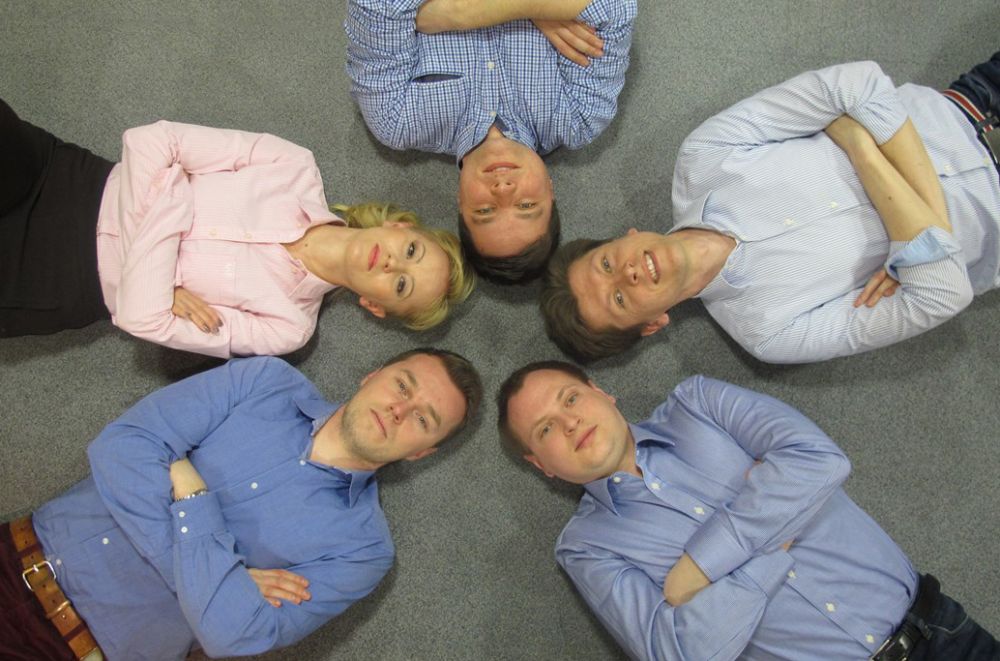
ABOUT THE IIMCB
The International Institute of Molecular and Cell Biology in Warsaw was established under an international agreement between the government of the Republic of Poland and UNESCO and a dedicated parliamentary act of 1997, so it has a unique legal status in the Polish scientific system. The IIMCB is directly supervised by the President of the Polish Academy of Sciences, who appoints members of the International Advisory Board and, upon the Board's recommendation, the Institute's director. The Board provides strategic advice on research directions, approves financial plans, conducts competitions for laboratory leaders and regularly evaluates the scientific outputs of laboratories. For years, the Institute has boasted the highest scientific category (A+) in the evaluation of scientific institutions by the Ministry responsible for science, including the latest one in 2022. To strengthen its international position, in January 2020 the IIMCB joined the EU-LIFE alliance of 15 independent research institutes from 15 European countries. This alliance works for excellence in life sciences, attaching great importance to the quality and integrity of science, while at the same time actively participating in shaping European science policy.
The main research directions at the IIMCB are RNA biology and cell biology, both aimed at understanding the fundamentals of human diseases, which are the basis for creating innovative therapeutic and diagnostic methods. The scientific excellence which we pursue involves the implementation of ambitious research projects and scientific initiatives, and forming partnerships with leading research centers in Poland and abroad. To ensure that the results of this research are translated into clinical applications, the IIMCB is open to cooperation with the pharmaceutical and biotechnological industries, including sharing the resources and expertise of our core facilities.
The IIMCB is involved in educating PhD students as one of the nine founders of the Warsaw PhD School in Natural and BioMedical Sciences (Warsaw-4-PhD). The School offers international doctoral students an interdisciplinary educational and research program in physics, chemistry, biology, and medicine. Next year we will celebrate the graduation of the first alumni of our School.
Research at the IIMCB is supported by an annual statutory subsidy from the Ministry responsible for science and a budgetary subsidy from the Polish Academy of Sciences. Still, up to 70% of the yearly institutional budget comes from external competitive sources. Since 2000, our scientists have received 354 grants. Many prestigious ones come from European and other foreign sources, such as: the EU Framework Programmes, including European Research Council, EU Structural Funds through the Foundation for Polish Science, European Molecular Biology Organization, Howard Hughes Medical Institute, the Wellcome Trust, European Economic Area and Norway Grants, and the Polish-Swiss Research Programme. In 2023, the IIMCB has started implementing an institutional project entitled “RNA and Cell Biology - from Fundamental Research to Therapies” (RACE) selected for funding in the Teaming for Excellence programme under Horizon Europe. IIMCB researchers at different career stages also benefit from diverse grants from Polish sources: National Science Centre, National Centre for Research and Development, Polish National Agency for Academic Exchange, Polish Science Fund and Ministry of Education and Science.
The well-being of the members of our community is paramount to us, thus the IIMCB follows the rules put forward by the European Commission in the HR Excellence in Research programme, which the IIMCB joined in 2013. The HR Excellence in Research logo is an accreditation that identifies institutions with a stimulating and favorable working environment. The recently adopted Gender Equality Plan includes measures to take it a step further: providing an assuring and conducive work culture based on the respect for the principles of equality and diversity. In doing so, we enable all employees to freely develop their scientific and personal skills.
Fourteen research groups comprise the present structure of IIMCB:
-
Dummy - do not remove or move +
-
1. Laboratory of Structural Biology +
-
2. Laboratory of Bioinformatics and Protein Engineering +
-
3. Laboratory of RNA Biology - ERA Chairs Group +
-
4. Laboratory of Molecular and Cellular Neurobiology +
-
5. Laboratory of Neurodegeneration +
-
6. Laboratory of Biomolecular Interactions and Transport +
-
7. Laboratory of Cell Biology +
-
8. Laboratory of Cellular Proteostasis +
- 1
-
Dummy do not remove or move +
-
9. Laboratory of RNA-Protein Interactions - Dioscuri Centre +
-
10. Laboratory of Iron Homeostasis +
-
11. Laboratory of Protein Structure +
-
12. Laboratory of Protein Metabolism +
-
13. Laboratory of Zebrafish Developmental Genomics +
-
14. Laboratory of Single-Molecule Biophysics +
-
15. Laboratory of Cellular Genomics +
-
16. Laboratory of RNA Viruses +
- 1

